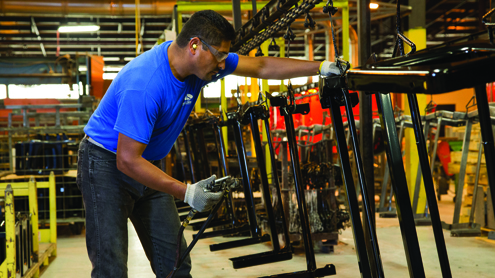
Vertical integration ensures safety and durability
By Don Simpson

The motorcoach and transit industries know it takes sophisticated manufacturing, design, testing and research to create safe, comfortable and durable seating. The components in the ideal seat — foam, wire, matting and tubular steel — might be obvious. The research, innovation, quality manufacturing and product testing that go into effective seating is sometimes overlooked. The focus today is on integrated seat manufacturing.
The fruits of R&D
Chemists are developing stronger, lighter, cooler and more durable foam, fiber and covering material. Their research and development has environmental implications as well. Some seating components made from recycled polyurethane foam and even soybean-based polyurethane foam reduce the need for petrochemicals.
Improvements to the shape, size and fabrication of a seat often come through new techniques applied to existing materials. For instance, a molded rebond seat back developed by Hickory Springs Manufacturing Company requires fewer fabricated parts, fewer glue seams and helps promote manufacturing consistency.
Metallurgical R&D helps suppliers select the optimum fabrication or joining technique for seat components: stamping, rolling and welding. Facing a number of challenges from stricter safety standards to the need to control costs and reduce environmental impact, quality R&D helps seat manufacturers and motorcoach OEMs deliver solutions..
The benefits of innovation
The ability to fabricate innovative solutions in-house is a key element in bringing innovation, such as the integration of new foams, fibers, wiring or metal components into the manufacturing processes. For example, the use of only two glue seams makes the seat back more durable, because it won’t soften over the frame. Rebond construction is beneficial because it resists materials breakdown, even under heavy use and in extreme temperatures. Innovative metal-forming techniques allow the quicker and more efficient manufacture of lighter, stronger frame components, which reduces the both the cost of manufacturing and the finished product. Because of R&D, a company such as Hickory Springs can offer more than 300 foam formulations nationwide for a wide variety of applications.
The scope of manufacturing
In-house manufacturing provides tremendous versatility as suppliers provide quality components made from metal stamping, tube forming, wire drawing, foam production, as well as woven and non-woven fibers. An in-house tempered steel wire drawing operation, for instance, allows new spring designs to go into production right away, and reduces the need for outsourcing, which can drive up product costs to OEMs. All seating elements can be created from a single source.
Seat suppliers can implement and monitor quality systems. They can implement such programs as lean manufacturing, continuous improvement and kaizen as means to optimize production.
The value of quality control
Dedicated testing facilities evaluate strength and durability, randomly selecting production seats for testing the frame’s ability to absorb impact and bend but not crush under stress. Some manufacturers require seats to pass a 250,000-cycle corner-flex fatigue test that simulates years of heavy use with no sign of breakdown. Stringent testing programs help ensure that seats meet federal motor vehicle safety standards, including FMVSS-222 for strength and crush resistance and FMVSS-302 for fire resistance. Test results can also provide feedback for R&D, as when testing showed that rebond seat backs are more durable than fabricated ones.
Vertically integrated product development and manufacturing has already proven its effectiveness in producing safe, durable, comfortable vehicle seating. Even as technology, materials, safety standards and the motorcoach and transit industries continue to change, vertical integration will ensure that the benefits of R&D, innovation, quality manufacturing and quality testing are built into the durable seating motorcoach operators and transit administrators need. BR
Don Simpson is general manager of diversified products for Hickory Springs Manufacturing Company.
